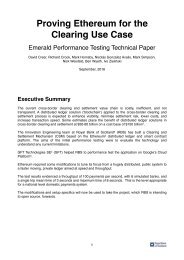Bitcoin and Cryptocurrency Technologies
1Qqc4BN
1Qqc4BN
You also want an ePaper? Increase the reach of your titles
YUMPU automatically turns print PDFs into web optimized ePapers that Google loves.
somehow, the node that created the block with the double‐spend transaction? Well, not really. As we<br />
mentioned earlier, it’s hard to know which is the morally legitimate transaction. But even if we did,<br />
it’s still hard to punish nodes since they don’t have identities. So instead, let’s flip the question around<br />
<strong>and</strong> ask, can we reward each of the nodes that created the blocks that did end up on the long‐term<br />
consensus chain? Well, again, since those nodes don’t reveal their real‐world identities, we can’t quite<br />
mail them cash to their home addresses. If only there were some sort of digital currency that we could<br />
use instead... you can probably see where this is going. We’re going to use bitcoins to incentivize the<br />
nodes that created these blocks.<br />
Let’s pause for a moment. Everything that we’ve described so far is just an abstract algorithm for<br />
achieving distributed consensus <strong>and</strong> is not specific to the application. Now we’re going to break out of<br />
that model, <strong>and</strong> we’re going to use the fact that the application we’re building through this<br />
distributed consensus process is in fact a currency. Specifically, we’re going to incentivize nodes to<br />
behave honestly by paying them in units of this currency.<br />
Block Reward. How is this done? There are two separate incentive mechanisms in <strong>Bitcoin</strong>. The first is<br />
the block reward. According to the rules of <strong>Bitcoin</strong>, the node that creates a block gets to include a<br />
special transaction in that block. This transaction is a coin‐creation transaction, analogous to<br />
CreateCoins in Scroogecoin, <strong>and</strong> the node can also choose the recipient address of this transaction. Of<br />
course that node will typically choose an address belonging to itself. You can think of this as a<br />
payment to the node in exchange for the service of creating a block on the consensus chain.<br />
At the time of this writing, the value of the block reward is fixed at 25 <strong>Bitcoin</strong>s. But it actually halves<br />
every 210,000 blocks. Based on the rate of block creation that we will see shortly, this means that the<br />
rate drops roughly every four years. We’re now in the second period. For the first four years of<br />
<strong>Bitcoin</strong>’s existence, the block reward was 50 bitcoins; now it’s 25. And it’s going to keep halving. This<br />
has some interesting consequences, which we will see shortly.<br />
You may be wondering why the block reward incentivizes honest behavior. It may appear, based on<br />
what what we’ve said so far, that this node gets the block reward regardless of whether it proposes a<br />
valid block or behaves maliciously. But this is not true! Think about it — how will this node “collect” its<br />
reward? That will only happen if the block in question ends up on the long‐term consensus branch<br />
because just like every other transaction, the coin‐creation transaction will only be accepted by other<br />
nodes if it ends up on the consensus chain. That’s the key idea behind this incentive mechanism. It’s a<br />
very subtle but very powerful trick. It incentivizes nodes to behave in whatever way they believe will<br />
get other nodes to extend their blocks. So if most of the network is following the longest valid branch<br />
rule, it incentivizes all nodes to continue to follow that rule. That’s <strong>Bitcoin</strong>’s first incentive mechanism.<br />
We mentioned that every 210,000 blocks (or approximately four years), the block reward is cut in half.<br />
In Figure 2.4, the slope of this curve is going to keep halving. This is a geometric series, <strong>and</strong> you might<br />
know that it means that there is a finite sum. It works out to a total of 21 million bitcoins.<br />
62









